Best Pot Size for Autoflowering Seeds
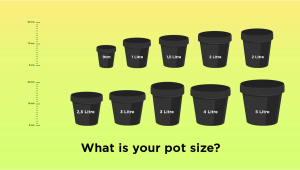
- 1. What to consider before planting
- 1. a. 1-4 large-sized plants (10-15 liters / 2.65-4 gallons)
- 1. b. 6-10 smaller plants (6.5-8.5 liters / 1.72-2.25 gallons)
- 1. c. Screen of green (10-15 liters / 2.65-4 gallons)
- 1. d. Using custom soil beds
- 2. It's all about the roots
- 3. The importance of drainage when growing autos
- 4. Which pots are best?
- 5. Plant directly in the pot you plan to harvest from
- 6. Expert opinion by jorge cervantes - co-author:
- 7. Top tips on choosing the best size pot for cannabis
- 8. What is the best growing medium for autoflowering cannabis?
- 9. In conclusion
Preface
Embarking on the journey of cultivating autoflowering cannabis seeds entails a myriad of decisions, each pivotal in its own right, to ensure the optimal growth and flourishing of the plants. One such crucial decision revolves around selecting the appropriate pot size for your seeds, a topic that is meticulously dissected in the article penned by Sean Prana. The article, titled "Best Pot Size for Autoflowering Seeds," delves into the nuanced considerations and variables that growers must ponder upon before settling on a pot size, ensuring that the chosen vessel not only accommodates but also nurtures the plant from seedling to harvest. From exploring various pot sizes, understanding the vitality of the root zone, to emphasizing the significance of drainage, the article is a comprehensive guide that navigates through these pivotal aspects with clarity and depth.
The article doesn’t merely present a one-size-fits-all solution but rather, it explores various scenarios and setups, providing a detailed guide on how different pot sizes can be leveraged for optimal growth in varied contexts. It discusses the benefits and drawbacks of different sizes and types of pots, from large-sized plants utilizing pots of 10-15 liters to smaller plants in a Sea of Green setup with pots of 6.5-8.5 liters. Furthermore, it sheds light on alternative methods like using custom soil beds and different growing mediums, such as coco-coir, providing a holistic view of the possibilities available to cultivators.
Sean Prana, the author, meticulously guides the reader through the various stages and considerations, ensuring that the information is not only accurate but also easily digestible. The article is structured in a way that it gradually builds up from the basic considerations to more advanced tips, ensuring that cultivators of all levels can glean valuable insights from it. It is not just a guide but a thorough exploration of the subject matter, providing readers with the knowledge and confidence to make informed decisions regarding their cultivation journey.
Once you have purchased your Fast Buds seeds and have germinated them, full of excitement and anticipation, next you will need to decide on the pot size, medium, and location. In this article, we explain the best pot size for cultivating autoflowering Cannabis from seed until harvest, which pots are best, the importance of drainage, including our top tips.
1. What To Consider Before Planting
Before you just pick any container size and throw your seedling in there, it is a good idea to consider a few variables that may help sway your decision. Thanks to the diversity of autoflowering Cannabis and how well they adapt to all climates, the options to grow one large plant, use SCROG, grow several smaller plants packed closely together, or simply plant directly into the ground are available. Each has their own benefits and are better explained below, so what's the best size pot for growing weed?
1-4 Large-Sized Plants (10-15 liters / 2.65-4 gallons)
If you are limited to plant count, or grow space then deciding to grow 1-4 large-sized plants will warrant the need for big pots such as 10-15L. The bigger the pots then taller the final plant should finish once harvest time comes around.
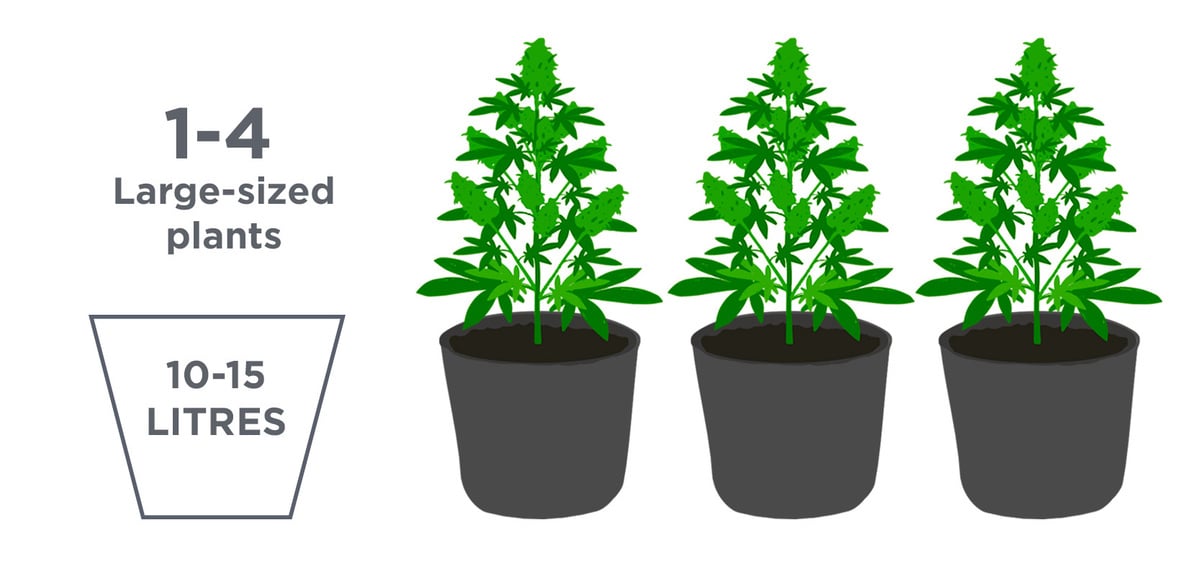
There is no need to grow autoflower seeds in a huge container size (bigger than 15L) because much of the medium will not be fully utilized as if using a 10L pot for example.
6-10 Smaller Plants (6.5-8.5 liters / 1.72-2.25 gallons)
Cultivating autoflowering Cannabis in a Sea of Green setup, using the right cultivar can reward a grower with great returns. An excellent way to use up all of the growing space and work with homogenous and uniform cultivars. Smaller pots of 6.5-8.5L will be fine.
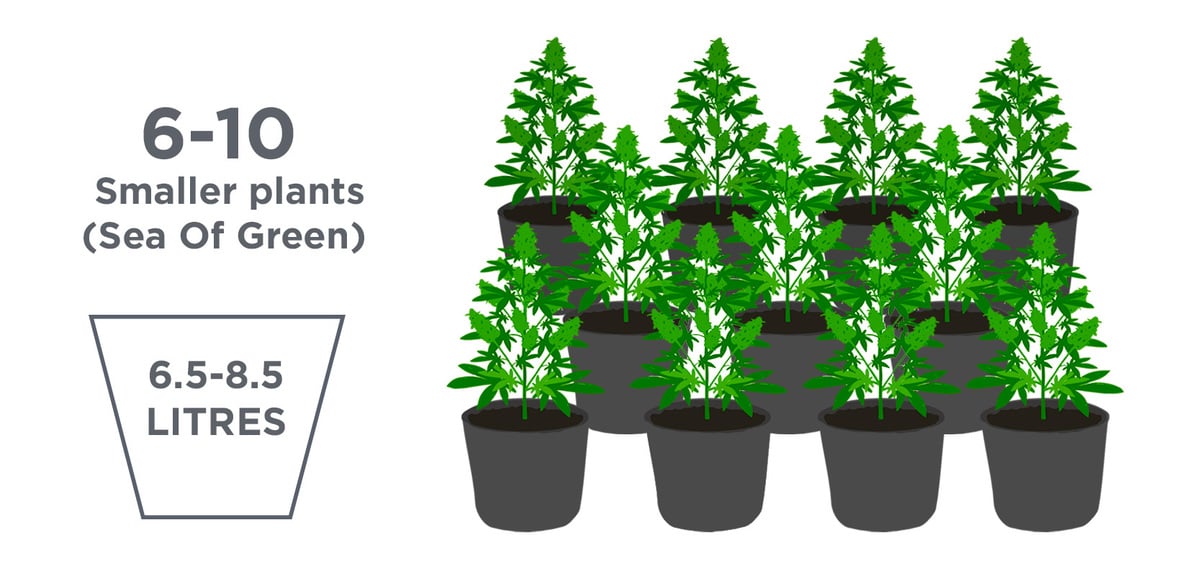
You may have smaller-sized plants resulting in lower yields, however, it will make up for that with the high number of plants.
Screen Of Green (10-15 liters / 2.65-4 gallons)
For the more adventurous grower skilled in-plant training, using a screen to grow your auto-flowering plants through has advantages when increasing yields. However, the screen may limit the mobility of your plants as they will be built into a net frame.
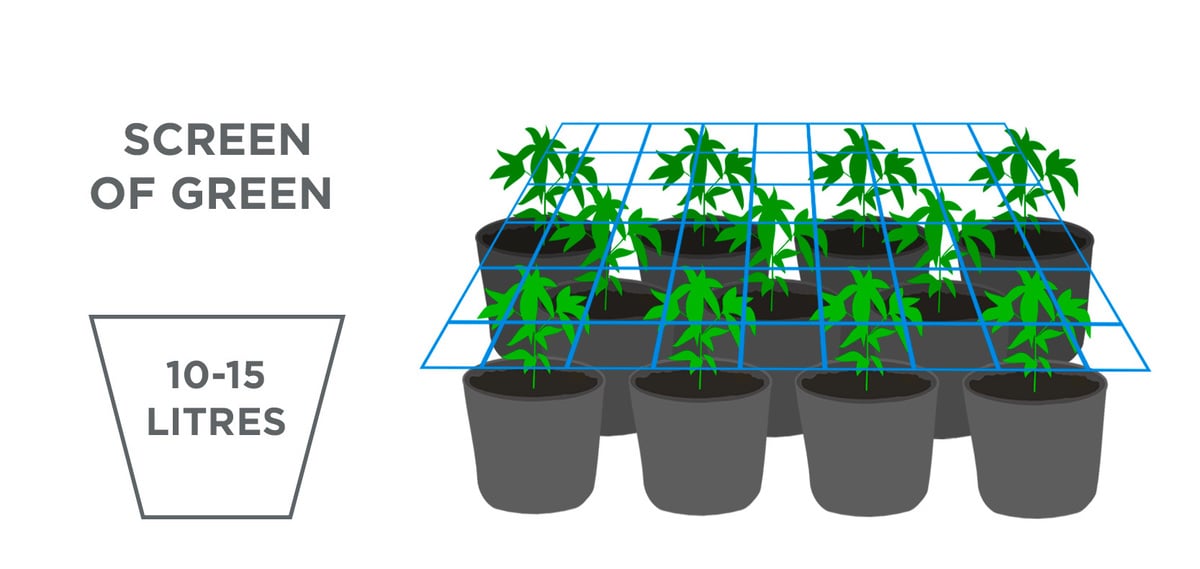
Using Custom Soil Beds
Another alternative if you prefer not to use mobile plant pots, is to plant directly into the ground. Preferably an organic soil bed that has been specially created for cultivating autoflowering Cannabis and is teaming with microbial life.
2. It's All About The Roots
In the gardening world there is a saying that the bigger the roots then the bigger the fruits, although when discussing autoflowering Cannabis, the root growth is somewhat limited. It is during the first 3-4 weeks that auto-flowering plants will use up Nitrogen, Phosphorus, and Potassium to aid the development of photosynthesis, chlorophyll production, and anchoring of a well-established root zone into the medium.
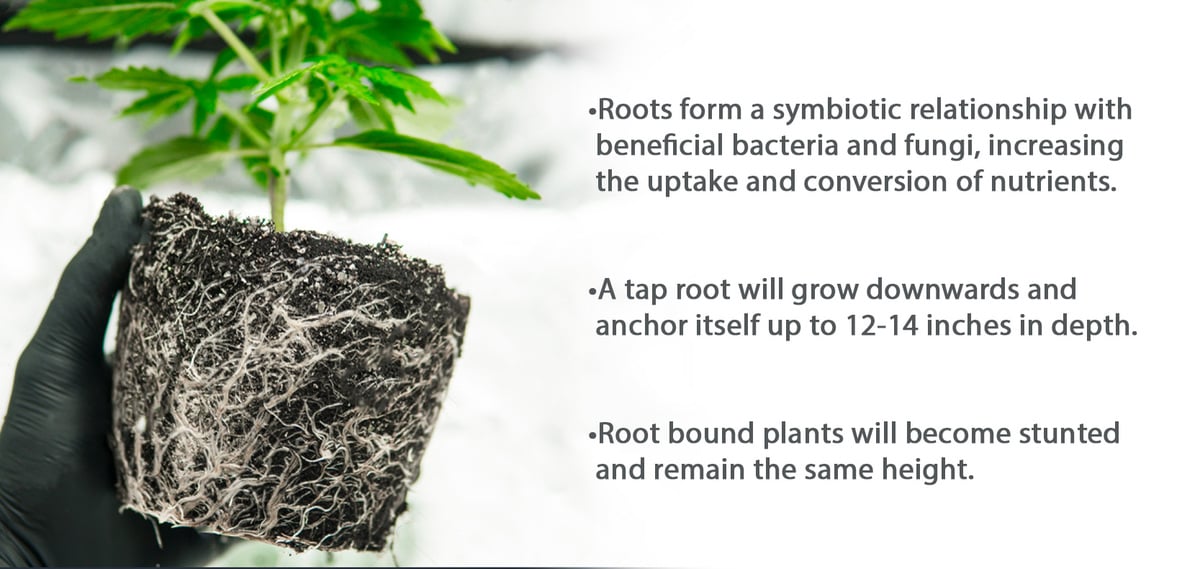
It is the root zone that is responsible for the uptake and distribution of nutrients, minerals, and the distribution of growth hormone to the rest of the plant pathways. How deep and wide the root zone is will make a huge difference in what is occurring above the soil.
3. The Importance of Drainage When Growing Autos
There are a number of qualities your pots should have, and the most basic yet often overlooked is drainage. How well your plants can drain, promoting air exchange through the root zone, and allowing the medium to dry out, will play a big role in the growth and development of the cultivar. Hydroton is small clay balls that are a bright orange color. Traditionally used in landscape gardening, and recirculating hydroponic systems, these nutrient-free and totally inert expanded clay balls work wonders to allow water to freely pass through.
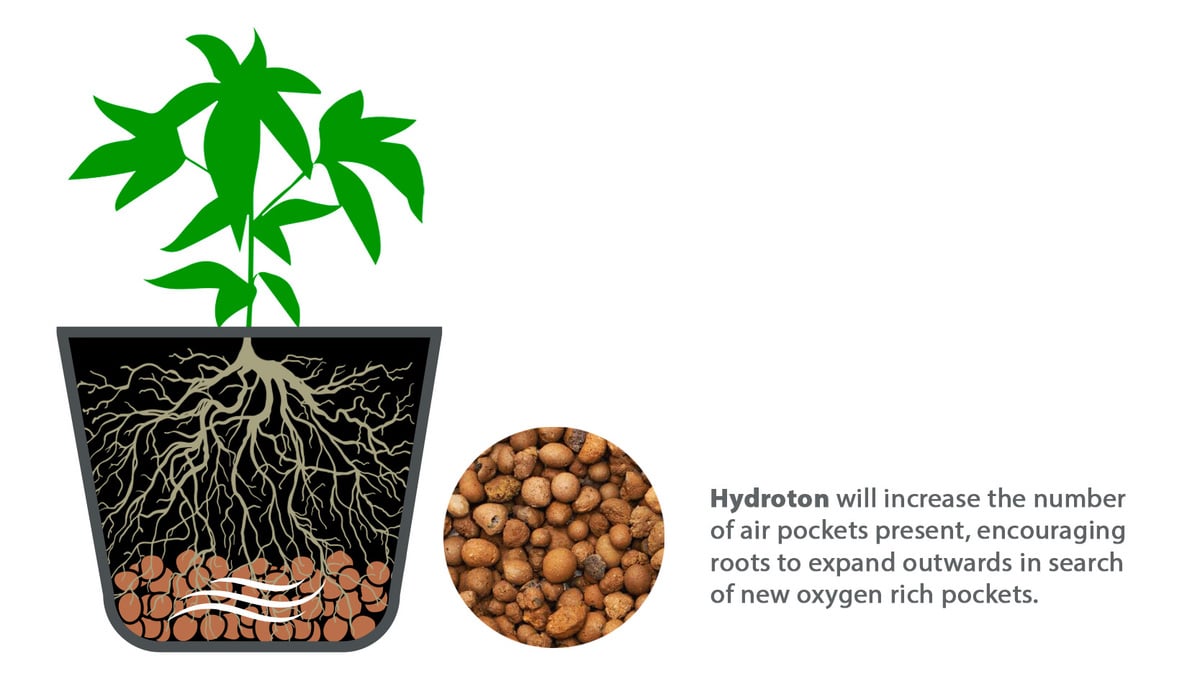
Paired with coco coir at a 50/50 ratio or used to line the bottom 1-2 inches of your pots, hydroton will increase the number of air pockets present, encouraging roots to expand outwards in search of new oxygen-rich pockets. Inadequate drainage will cause the growing medium to become waterlogged, over time reducing the oxygen around the roots. Not only will roots suffer when this occurs, but nutrient uptake and transpiration will also temporarily cease until the preferred conditions are met.
4. Which Pots Are Best?
Fabric pots are far more beneficial than traditional plastic pots with holes in the bottom. Not only are felt pots more environmentally friendly, but they can also be easily washed, re-used, and most importantly will promote root pruning. In the same way, topping a Cannabis plant will cause the two crown shoots to grow in replacement of the one that was topped, root hairs will do the same. This, of course, occurs in the dark, warm environment that exists in the medium when root hairs travel to the side of the pots. As they come into contact with the outside air, they will form two root hairs and then turn back until the same process takes place repeatedly.
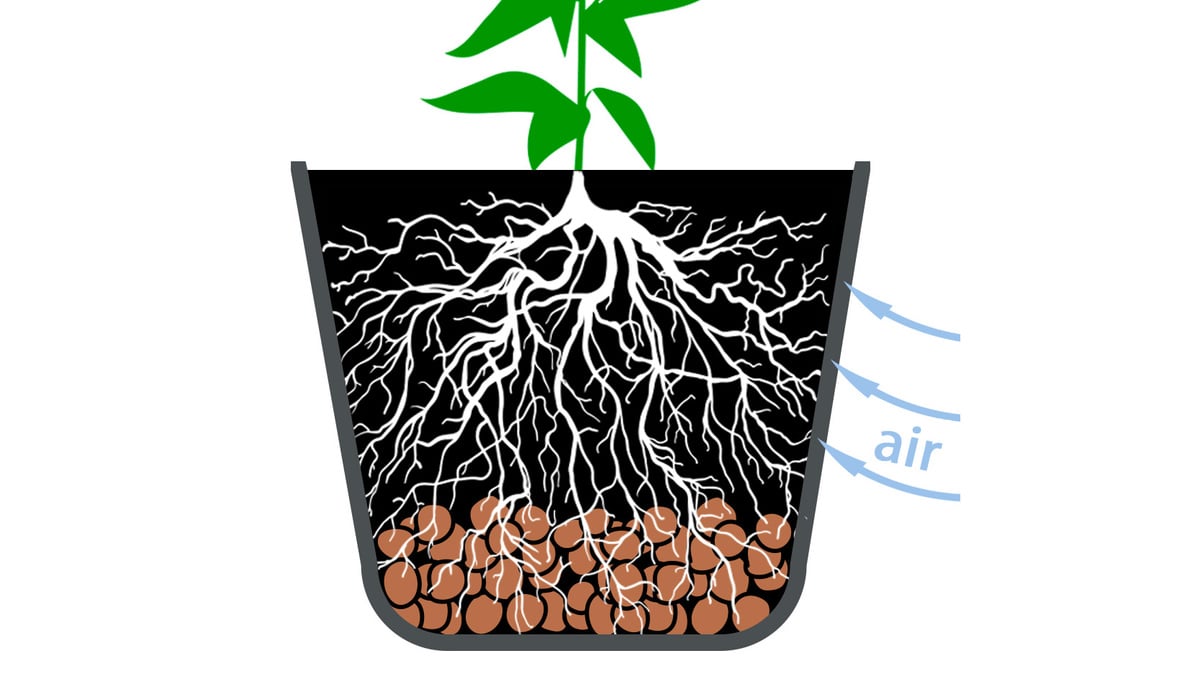
- Root pruning will produce a far superior plant in comparison to one grown in plastic containers.
- The concern for root-bound plants that will become stunted is eliminated with felt containers.
- They can be made at home to your custom size and easily washed and cleaned between use.
Just remember that the proper air pot size for autoflower is the same as any other pot size but the difference is that when growing in air pots or fabric pots, the roots get pruned by air naturally, as they would in nature; This means that it's harder for your plants to get rootbound and due to the roots getting pruned slowly and gradually, it won't affect your yields or strunt growth. Obviously, they're more expensive than regular plastic pots so you will have to see if they're worth it in your case but a lot of growers have compared them side to side and the plant in the air or fabric pot grows slightly better, but as always, it's up to you to experiment and reach your own conclusions.
5. Plant Directly in the Pot You Plan to Harvest From
Autoflowering cannabis strains are fantastic. They offer huge advantages in many ways over photoperiod cannabis plants - smaller overall size for extra discreetness, much simpler lighting demands meaning they can be grown all year round outdoors and easier perpetual harvest routines, higher resilience against pests and diseases, smaller feeding demands, and all still with bumper yields in shorter periods.
But, they do come with one pretty obvious downside (depending on how you like to grow). They really can’t handle stress or training in the same way as photoperiod plants. This is due to the fact that thanks to the inbuilt genetic timer that all autos carry, they simply do not have the time to recover before the flowering stage of growth begins. Any sort of stress or training that your plants undergo causes a pause in the vegetative growth while the plant recovers. This pause could last anywhere from about 4 days to a week and a half, depending on the overall health of the plant and how heavy the stress imparted upon it is.
One of the huge upsides of autoflowering cannabis plants is the short lifecycle. Depending on the strain (and to some respect, the phenotype - variances within a strain) they usually take less than 10 weeks from seed to harvest. And with today’s genetics, they still offer plus 25% THC and huge yields. Amazing, right? But, this means that autos usually have less than a month of vegetative growth before they automatically switch over to the flowering period. Stressing or training a plant should always be done during the vegetative growth stage so you do not stunt the flowering growth. This is fine with photoperiod plants, as you can simply extend the veg growth period by keeping the lights at 18/6. Not the case with autos.
To combat this, you need to give your auto girls the best chance of hitting their full potential. Every time you transplant a cannabis plant you put her under stress, which will definitely stunt the growth for at least a few days. To counter this all you have to do is plant directly into the container you plan to harvest from. This gives your autos the best chance at reaching their full potential. Now, this is a generalization. For sure, there are some autoflowering strains that can deal better with training and stress. If you love experimenting with different training techniques and pot sizings then we suggest that you stick with the larger autos in our collection. Sativa-dominant strains usually run a little longer than their Indica sisters, and this means you have a little more time to play.
6. Expert Opinion by Jorge Cervantes - Co-Author:
In the vibrant world of cannabis cultivation, the devil is often in the details, and Sean Prana’s article on selecting the best container size for autoflowering seeds elegantly encapsulates this sentiment. The article is a thorough, well-structured guide that navigates through the intricacies of container sizes and their impact on the cultivation of autoflowering cannabis, a topic that is often overlooked yet paramount in its importance.
Sean’s approach to explaining the various considerations and variables in choosing a container size is commendable. His insights into the different scenarios and setups, from large-sized plants to smaller plants in a Sea of Green setup, provide growers with a comprehensive understanding, allowing them to make informed decisions tailored to their specific garden needs. Furthermore, his exploration of alternative methods and growing mediums, such as using custom soil beds and coco-coir, adds a layer of depth to the article, showcasing the myriad of possibilities available to growers.
The emphasis on the importance of the root zone and drainage is particularly noteworthy. These aspects are often neglected, yet they play a pivotal role in ensuring the optimal growth and health of the plants. Sean’s detailed exploration of these aspects, from explaining the role of the root zone in nutrient uptake and distribution to highlighting the significance of proper drainage, provides readers with essential knowledge that can significantly impact their cultivation journey.
In conclusion, Sean Prana’s article is an excellent resource that combines detailed information with practical insights, providing a comprehensive guide on selecting the best container size for autoflowering seeds. His expertise and thorough exploration of the subject matter make the article a valuable resource for cultivators, ensuring that they are well-equipped with the knowledge to make informed decisions that will optimize the growth and yield of their plants.
7. Top Tips On Choosing The Best Size Pot For Cannabis
1. Decide in advance based on your space what format of growing, works to your advantage. If 1-4 large-sized plants are more practical, or if a Sea of Green has more advantages.
2. No matter if you are choosing plastic or felt, make sure the pots have been totally cleaned and sterilized to the best of your ability. Especially if re-using the container for a second or third run.
3. Lots of smaller-sized plants will yield the same amount as fewer large-sized plants, so do not be tricked into thinking a Sea of Green is not advantageous or worthwhile.
4. Do not use more than 15 liters (4 gallons) of medium per auto-flowering plant. It is best to work with sizes 6.5-15 liter (1.7-4 gallons) depending on the chosen style of growing, the cultivar, and the climate you are living in.
5. If you have a sewing machine, ordering a large roll of thick felt will allow you to customize your own pots, making them the exact size and shape you prefer.
6. Adding a bottom layer of hydroton clay balls at the base of your pots will improve drainage and the exchange of oxygen around the root zone.
8. What is The Best Growing Medium for Autoflowering Cannabis?
So, we have run through the best container sizes for autos. And we've gone over the best types of pots. But what about the best thing to fill them with? There are a couple of options out there, but in our opinion, coco-coir is the clear winner for a few reasons.
Coco-Coir
Coco, or coco coir, is a great option for autoflowering cannabis. It's a sustainable byproduct of the coconut industry, and it's perfect for growing weed. Coir has just the right amount of drainage and air porosity that cannabis roots need to thrive. And it holds on to just enough water to keep your plants thriving while never becoming so saturated that the roots suffocate. When it comes to coco coir, the material isn't as important as the size. The main thing you want to look for is a product that's been properly washed and buffered. You don't want any extra salts or chemicals in your growing medium, as they can cause more harm than they're worth, especially for seedlings.
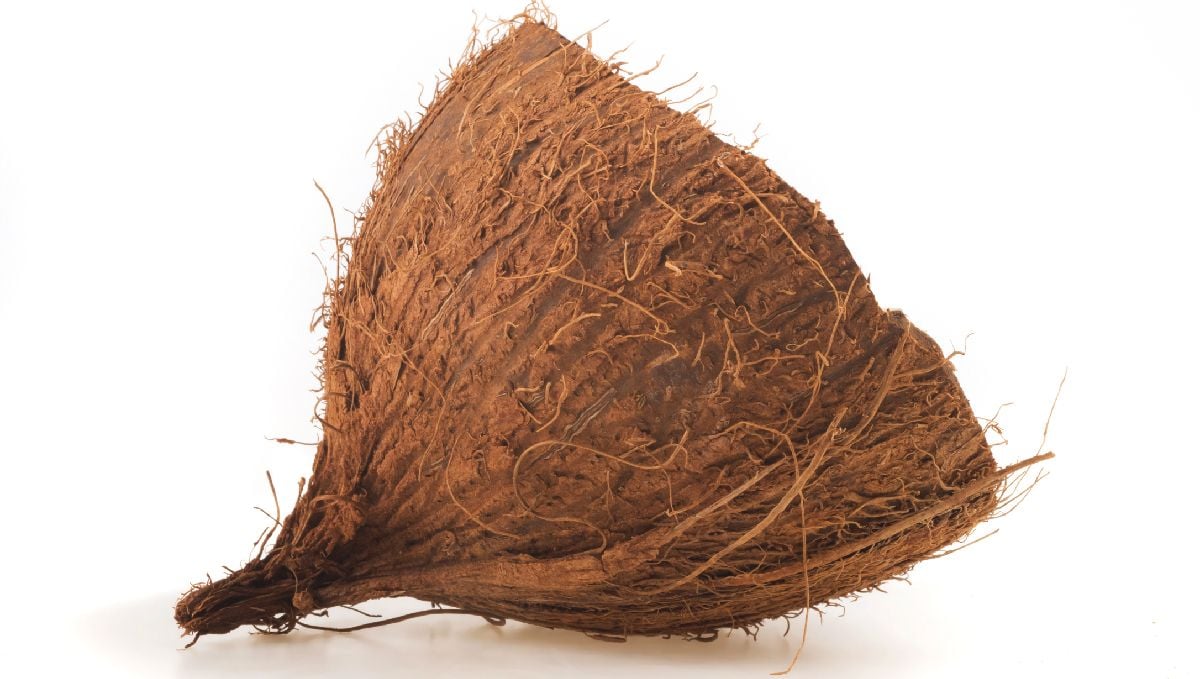
Coco-coir is a totally inert substrate, meaning it is naturally free of all nutrients. This might sound like a disadvantage, but it is actually the total opposite. By having full control over the nutrient supply, you can really dial in exactly what the crop is receiving, and the timing. Just like your normal hydro setup, you need to add all of the nutrients into the feed water (if you go down the liquid nute route, as most do). This can be a little daunting for new growers, and while it is a bit of a steep learning curve, it's all pretty basic stuff.
There are a few key pieces of equipment that you'll need to invest in when growing in coco-coir:
- A pH pen - this is used to check the pH of the feed water. Cannabis (and all other plants) can only uptake nutrients when the root zone is within a certain pH range, and so by feeding the crop with feed water at the correct pH you ensure that the plants get the optimal feeding environment. For coco-coir crops, you want the feed water to be within a 5.5 to 6.5 ph range.
- An EC or TDS meter - Both of these pieces of kit test the number of nutrients in the feed water, and give you a very precise readout. This is extremely important, as it is almost impossible to know where this level sits without one of these meters. To get optimal growth, you need to provide the crop with the perfect amount of nutes. This changes as the crop grows, check out this article for a full guide on feeding coco-coir crops.
It strikes the perfect balance between soil and hydroponic cultivation and offers many of the advantages of both while skipping a few of the key disadvantages. You can get great results with soil cultivation, but coco-coir is just better. Again, this is an opinion, and you'll find a bunch of cultivators out there who will disagree. Try out a few options for yourself, and see which suits you best.
What about full hydroponic systems?
Hydro systems work amazingly well, but for beginners the learning curve is huge. they are also pretty easy to mess up, and very hard to save once a mistake has been made. Do yourself a favor and stick to soil or coco for your first few crops, and then think about making the switch. There's a lot to learn when growing weed, and diving headfirst into hydro has been the downfall of many a young grower.
9. In Conclusion
There's no such thing as a best size pot or perfect pot size to grow cannabis because it depends on your preferences and growing setup, there is a balance between growing in a container size that is too small and growing into something so large that the medium, nutrients, and vital grow space are not fully being taken advantage of.
Fabric pots will increase root mass, prevent air pruning, and help save the planet at the same time. Learning which autoflowering cultivars adapt better to which scenario takes time and experience and will help give you the upper hand when it comes to efficiency and productivity. For smaller-sized pots we advise Gorilla Zkittles Auto, Gelato Auto, and Sour Jealousy Auto. When it comes to cultivating in large-sized pots, we recommend Orange Sherbet Auto, Wedding Cheesecake Auto and Bruce Banner Auto.








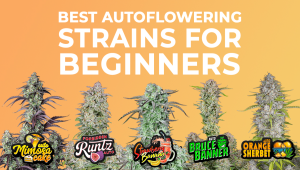

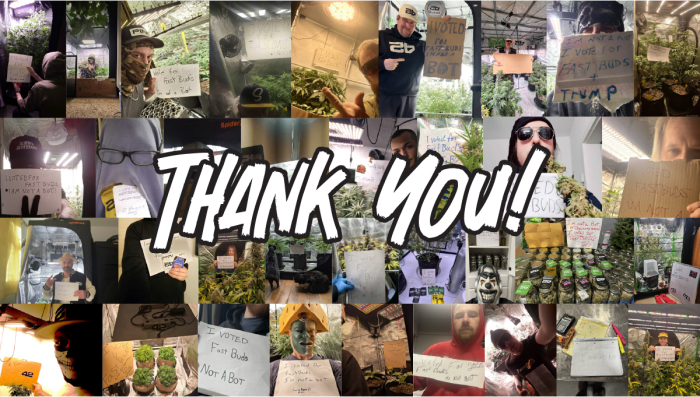

Comments